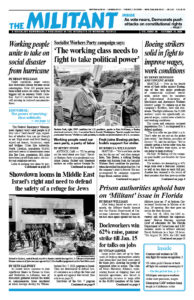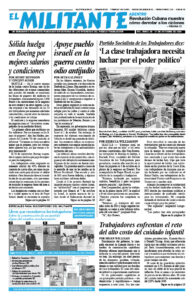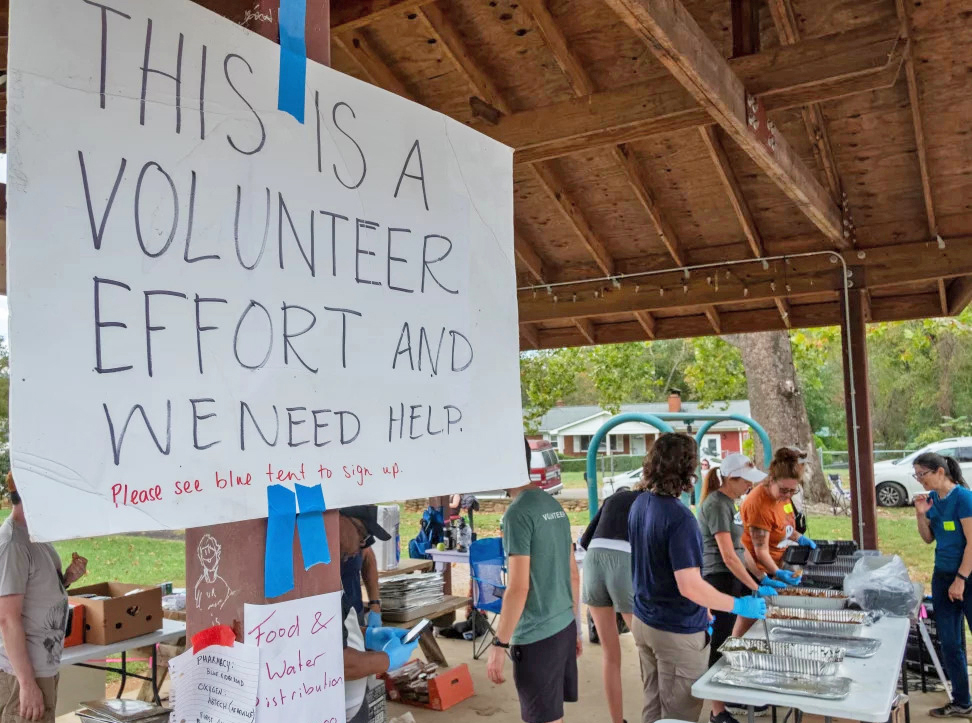Under capitalism, major storms like Hurricane Helene become social catastrophes. Over 225 people have been killed across six states, with the biggest toll in western North Carolina. And it’s unclear how many are still missing in isolated communities there.
The Federal Emergency Management Agency won’t send people in if they see a “road closed” sign, regardless of whether they can get through or not. High winds and flash flooding wiped out homes, businesses, roads and bridges. Cities like Asheville, North Carolina, population 93,000, and rural towns in mountainous areas like Bat Cave, population 180, alike have been cut off from water, electricity and cellphone service.
Little to nothing was done by government authorities to help evacuate those living in the path of the storm, or provide assistance afterward. Their message was, “You’re on your own. Fend for yourself.”
In stark contrast, “As soon as the storm’s destruction became apparent, ordinary people from all over began a massive aid effort,” subscriber Diane Shur wrote to the Militant from Greensboro, North Carolina. “Small-plane pilots from the Greensboro area rapidly organized themselves to collect and fly aid into the remote areas. A mountain ranch that has pack mules and horses organized to get aid to some of the most hard-to-reach areas. Here in Greensboro, store shelves that are usually full of water and paper goods are empty, as they have been bought up by shoppers making donations.”
Black Mountain, located east of Asheville, is a town devastated by the flooding of the Swannanoa River. A government alert sent out there read, “Stay in the house. Stay away from the window,” Kimberly Moody, a 53-year-old UPS worker, told the New York Times. “No one said to leave.”
Many never heard any warnings because of damaged or out-of-range cellphone service, nor on landline phones because they don’t receive them. In some areas like Haywood Country north of Asheville, siren systems that authorities purchased after the last storm had never been installed.
In Clinton, a town of 4,400, officials sent out an alert advising residents to take the storm seriously, but no aid was organized to help people evacuate. Some just didn’t want to risk it and couldn’t afford the travel and hotel expenses.
Denia Zuniga, 44, originally from Honduras and who now lives in Swannanoa, one of the hardest-hit areas, worked back-to-back shifts cleaning homes Sept. 26 and didn’t know anything about the approaching storm. “We lost everything,” she told the Asheville Citizen-Times. “Everything we owned was in that house. We would’ve evacuated, knowing what was coming.”
Plastics factory workers swept away
Eleven workers employed at the Impact Plastics factory in the rural town of Erwin, Tennessee, were swept away after bosses kept them working while flooding from the nearby Nolichucky River reached dangerous levels. Three of them died, five were rescued and the others are still missing.
“We asked them if we should evacuate, and they told us not yet, it wasn’t bad enough,” Jacob Ingram, a mold changer at the factory, told News 5 WCYB. A guy in a 4×4 truck stopped to pick up the workers. Ingram said he survived by grabbing onto plastic pipes on the truck. Four others floated away.
The hurricane severely damaged a Baxter International plant in North Cove, North Carolina, that makes much of the country’s supply of sterile intravenous, or IV, fluid. The company closed the factory, throwing more than 2,500 people out of work.
Fewer than one in 100 households in the worst-flooded inland counties of North Carolina have flood coverage, the Insurance Information Institute reports. Insurance profiteers have raised rates and deductibles and limited what their policies cover. Typical home insurance doesn’t cover flooding.
Stephanie Buchanan, who lives in Bakersville, learned this the hard way after her belongings were swept away in rising creek waters and she was informed her home insurance company wouldn’t cover it. In Mitchell County, where Bakersville is located, just 31 homes have flood insurance out of more than 8,600 housing units.
Volunteers organize assistance
Local aid from the federal and state governments has been slow and for many, nonexistent. “We’ve never depended on them before,” Amber Capps, president of the Cruso Community Center west of Asheville, told the Times. Volunteers there and in other towns were driving excavators and tractors to clear debris from roads. Restaurants dispatched food deliveries to homes.
Local airports like the City of Statesville Regional Airport and Hickory Regional Airport have become centers for carload and truckload donations of food, medicine and fuel that private pilots deliver.
“FEMA called me and told me they wanted to inspect my house,” Chelsea Atkins in Bat Cave told New York Post reporters, “then called me back to say they couldn’t drive around the ‘Road Closed’ sign. They weren’t allowed.” The Post reporters had made it there fine.
“It’s been a civilian-run operation since day one,” she said. Volunteers who came included apple orchard workers with chainsaws who worked with a local grading contractor to clear the road.
Volunteer pilots from the United Cajun Navy based in Louisiana flew at least 30 different aircraft, from helicopters to fixed-wing planes, to Black Mountain delivering supplies and doing search and rescue Oct. 2.
That same day Homeland Security Secretary Alejandro Mayorkas announced that FEMA doesn’t have funds for the rest of the hurricane season. “We need help but I have not seen anyone from FEMA. I don’t even know where to begin,” Nelson Cruz told the Times. His trailer, like those of most residents living in a trailer park in Swannanoa, was swept away.
To add insult to injury, Transportation Secretary Pete Buttigieg Oct. 2 ordered private drone flights suspended in North Carolina’s Hurricane Helene flood zone. Volunteer operators have been instrumental in delivering vital items like insulin and baby formula to isolated areas.
These examples show the capacities of the working people and the potential of what could be done if they held political power in their own hands.


